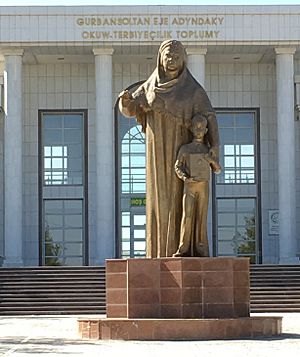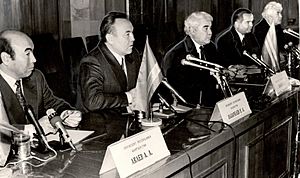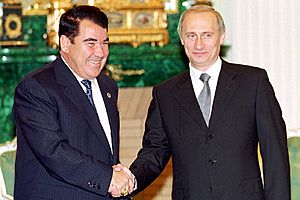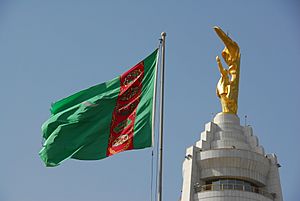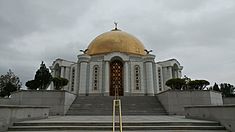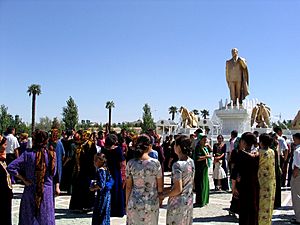Saparmyrat Nyýazow facts for kids
Quick facts for kids
Saparmyrat Nyýazow
|
|
|---|---|
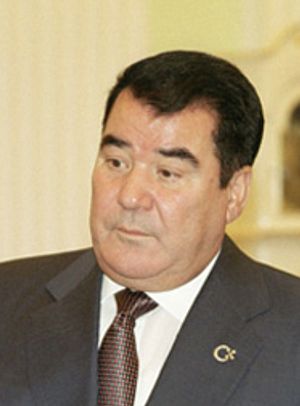
Nyýazow in 2002.
|
|
| 1st President of Turkmenistan | |
| In office 2 November 1990 – 21 December 2006 |
|
| Prime Minister | Han Ahmedow (1990–92) |
| Vice President |
|
| Preceded by | Office established |
| Succeeded by | Gurbanguly Berdimuhamedow |
| Leader of the Democratic Party of Turkmenistan | |
| In office 27 October 1991 – 21 December 2006 |
|
| Preceded by | Office established |
| Succeeded by | Gurbanguly Berdimuhamedow |
| First Secretary of the Central Committee of the Communist Party of Turkmenistan | |
| In office 21 December 1985 – 16 December 1991 |
|
| Preceded by | Muhammetnazar Gapurow |
| Succeeded by | Office abolished |
| Full member of the 28th Politburo | |
| In office 14 July 1990 – 29 August 1991 |
|
| Personal details | |
| Born |
Saparmyrat Ataýewiç Nyýazow
19 February 1940 Gypjak, Turkmen SSR, Soviet Union |
| Died | 21 December 2006 (aged 66) Ashgabat, Turkmenistan |
| Political party | TDP |
| Spouse | Muza Melnikova |
| Children |
|
| Parents |
|
| Education | Leningrad Polytechnic Institute |
| Profession | Electrical engineer |
| Nickname | Türkmenbaşy |
| Military service | |
| Allegiance | |
| Branch/service | |
| Rank | General of the Army |
Saparmyrat Ataýewiç Nyýazow (born February 19, 1940 – died December 21, 2006) was a very important politician in Turkmenistan. He was also known as Türkmenbaşy, which means "Head of the Turkmen people." He led Turkmenistan as its first president from 1985 until he passed away in 2006.
He was the leader of the Turkmen Communist Party before Turkmenistan became independent. After the country gained its freedom from the Soviet Union in 1991, he continued to lead for 15 more years. In 1999, the country's parliament even declared him "President for Life." During his time, he was known for being a very strong leader who had a "cult of personality" around himself. This means he encouraged people to admire him greatly. He also made some unusual rules, like renaming months and days after his book, the Ruhnama.
Contents
Who Was Saparmyrat Nyýazow?
Early Life and Rise to Power
Saparmyrat Nyýazow was born on February 19, 1940, in a place called Gypjak, near Ashgabat. This was in the Turkmen Soviet Socialist Republic, which was part of the Soviet Union. His family belonged to the important Teke tribe.
His father, Atamyrat Nyýazow, died fighting in World War II. His mother and two brothers were sadly killed in a big earthquake in Ashgabat in 1948. After this, he grew up in a Soviet orphanage for a while.
Nyýazow finished school in 1959. He then studied to become an electrical engineer at the Leningrad Polytechnic Institute in Russia, graduating in 1967.
In 1962, Nyýazow joined the Communist Party. He quickly moved up in the party, becoming the First Secretary of the Communist Party in Turkmenistan in 1985. This happened after the previous leader was removed. Nyýazow's party was known for being very strict. In 1990, he became the head of the Turkmen parliament, which was like being president.
Becoming President of Turkmenistan
Nyýazow supported a coup attempt in the Soviet Union in 1991. But when it failed, he worked to make Turkmenistan independent. On October 27, 1991, Turkmenistan declared its independence, and Nyýazow became the country's first president.
In 1992, he was the only candidate in the presidential election and was chosen as the first president elected by the people. A year later, he gave himself the title Türkmenbaşy, meaning "Leader of all Turkmen." In 1994, people voted to let him stay president until 2002. Then, in 1999, the parliament made him "President for Life."
Nyýazow was married to Muza Melnikova, and they had a son named Murat and a daughter named Irina.
Leading Turkmenistan (1990–2006)
When Nyýazow became president, Turkmenistan was changing from a Soviet republic to an independent country. He tried to create a new cultural identity for Turkmenistan. He wrote a book called the Ruhnama, which he wanted people to read to learn about his ideas and Turkmen culture. He also created new holidays and introduced a new Turkmen alphabet based on Latin letters, replacing the old Russian Cyrillic one.
Even though he talked about moving to a market economy and a full democracy, these changes didn't really happen. The government kept tight control over the economy, and his rule remained very strict.
Economy and Resources
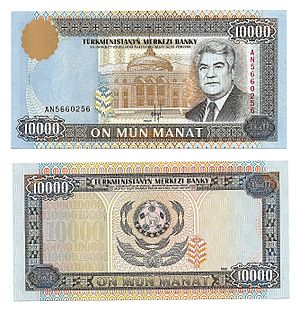
Turkmenistan has a lot of oil and natural gas, which brought in a lot of money for the country. The government controlled how these resources were used. Nyýazow wanted Turkmenistan to process its own oil instead of just selling it raw.
In 1991 and 2001, Nyýazow made water, gas, electricity, and salt free for everyone to use for ten years.
Turkmenistan also grows a lot of cotton and grain. Nyýazow continued the practice of setting yearly goals for farming. He also started a textile industry in Turkmenistan. He even created a special holiday called "Melon Day" in August, celebrating melons, which he called a "gift of God." This holiday is still celebrated today.
Culture and Changes
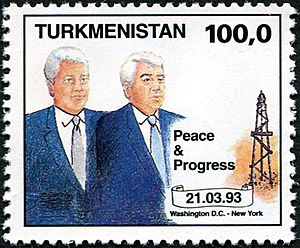
Nyýazow made it a top goal to bring back Turkmen culture. He introduced a new Turkmen alphabet based on Latin letters. He also started an organization called the National Revival Movement to promote Turkmen culture.
Some of his most noticeable changes were renaming the months and days of the week. For example, September was renamed Ruhnama after his book. October became Garaşsyzlyk (Independence) to mark the country's founding. These names were later changed back by the next president.
His father's service in the Red Army during World War II was used to shape how Turkmenistan celebrated Victory Day (9 May). Nyýazow made sure the country's sacrifices in the war were remembered.
Rules and Decrees
Nyýazow made many unique rules and laws during his presidency:
- He stopped the death penalty.
- He closed the Academy of Sciences of Turkmenistan in 1998, which was later reopened.
- He closed most internet cafes and controlled internet access.
- In 2005, he ordered all hospitals outside the capital, Ashgabat, to close. He said sick people should come to the capital for treatment.
- He also closed all libraries outside the capital, believing people only needed to read the Qur'an and his Ruhnama.
- He banned lip syncing at public concerts and sound recordings at many events.
- He declared Turkmenistan a "neutral state," meaning it would not join military groups.
- He banned dogs from Ashgabat because of their "unappealing odor."
- He made his book, the Ruhnama, a required read in schools, universities, and government offices. People even had to pass an exam on it to get a driver's license.
- He ordered a "palace of ice" (an indoor ice skating rink) to be built near the capital, even though Turkmenistan is a desert country.
- After he quit smoking, he banned smoking in all public places.
- He outlawed opera, ballet, and circuses in 2001, saying they were "unturkmen-like."
- He ordered that men should not wear long hair or beards.
- He banned news reporters from wearing makeup on television.
- He also ordered that every TV broadcast begin with a promise that the broadcaster's tongue would shrivel if they spoke badly about the country, flag, or president.
- He discouraged gold teeth, suggesting people chew on bones to strengthen their teeth.
- He banned video games because he thought they were "too violent."
Foreign Policy
Nyýazow wanted Turkmenistan to be a strictly neutral country in world affairs. This meant it would not join military alliances like NATO. The United Nations recognized Turkmenistan's permanent neutrality in 1995.
Opposition and Control
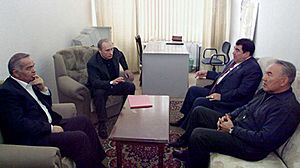
In 2002, there was an attack on Nyýazow's motorcade. He said it was an attempt to overthrow him. After this, many people were arrested. Some critics believed the government might have planned this event to crack down on people who disagreed with Nyýazow.
In 2004, leaflets appeared in Ashgabat calling for Nyýazow to be removed from power. He responded by firing his Interior Minister and ordering surveillance cameras to be placed on major streets.
Cult of Personality
Nyýazow created a very strong "cult of personality" around himself. This meant he wanted people to see him as a hero and a very special leader. His image was everywhere, replacing older symbols. He renamed towns, schools, airports, and even a meteorite after himself and his family members. The national anthem of Turkmenistan also mentioned him.
In Ashgabat, he built a tall, golden statue of himself that slowly turned to always face the sun. He even gave every citizen a watch with his picture on it.
He also used the education system to promote his ideas. His book, the Ruhnama, became the main textbook in all schools. He claimed that those who read it three times would go to heaven.
During his rule, there was no freedom of the press or freedom of speech. People who spoke out against him were often imprisoned or forced to leave the country. His image was even used as a logo on television. All these things made many people outside Turkmenistan see him as a very powerful and unusual leader.
Death and Funeral
On December 21, 2006, state television announced that President Saparmyrat Nyýazow had died from a sudden heart attack at his home. He was 66 years old. He had been taking heart medication for a few years.
Nyýazow did not name anyone to take his place before he died. According to the law, the head of the parliament, Öwezgeldi Ataýew, should have become president. However, Ataýew was arrested, and Gurbanguly Berdimuhamedow was named acting president. A new election was held in February 2007 to choose the next president.
Nyýazow was buried on December 24, 2006, in his special tomb at the Kipchak Mosque in his home village of Gypjak. Many people, including leaders from other countries, came to pay their respects. His body lay in an open coffin at the presidential palace before the burial. The national anthem was played, and a 21-gun salute was fired.
Funeral Attendees
Many important people from around the world attended his funeral, including:
- Hamid Karzai, President of Afghanistan
- Nursultan Nazarbayev, President of Kazakhstan
- Mikhail Fradkov, Prime Minister of Russia
- Abdullah Gül, President of Turkey
- Recep Tayyip Erdoğan, Prime Minister of Turkey
- Viktor Yanukovych, Prime Minister of Ukraine
Legacy
After Nyýazow's death, the new president, Gurbanguly Berdimuhamedow, started to remove some parts of Nyýazow's personality cult. In 2008, the names of the months and days of the week were changed back to their original names. The national anthem was also changed to remove references to Nyýazow.
The new president also reduced the importance of Nyýazow's book, the Ruhnama. By 2014, universities no longer tested students on their knowledge of the book. Some statues and portraits of Nyýazow were also moved or removed. The famous rotating golden statue of Nyýazow was moved from the center of Ashgabat to the edge of the city. New money also did not feature his portrait.
However, Saparmyrat Nyýazow is still a celebrated figure in Turkmenistan. His birthday is remembered as "Turkmenbashy Remembrance Day." Some of his creations, like "Melon Day," are still celebrated. Several places are still named after him, including the city of Turkmenbashy and the Turkmen Agricultural University.
Nyýazow's two children have stayed out of politics since his death.
See also
 In Spanish: Saparmyrat Nyýazow para niños
In Spanish: Saparmyrat Nyýazow para niños
 | James B. Knighten |
 | Azellia White |
 | Willa Brown |


